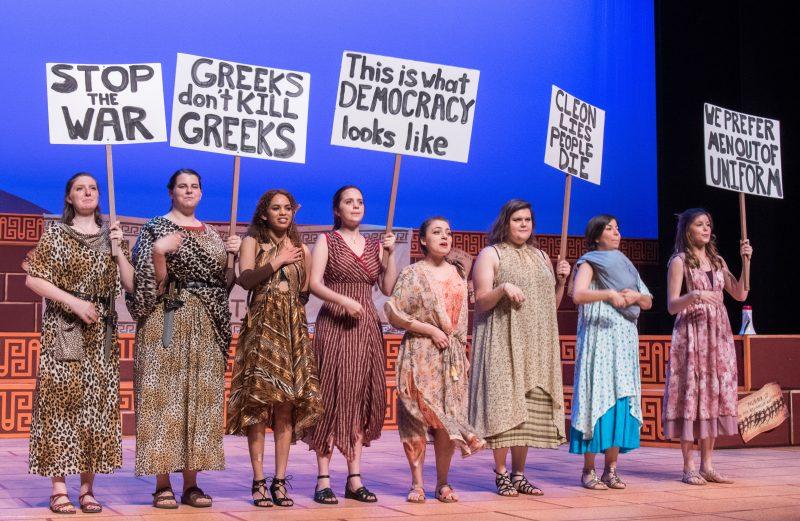The Trinity University theater department raised the curtain last Friday on the last main-stage production of the Spring semester: Aristophanes’ “Lysistrata,” adapted for the modern stage by Ellen McLaughlin and directed by Stacey Connelly.
The ancient Greek play is at its core a deeply misogynistic text, but in general, modern readings of the narrative interpret the story as that of women in antiquity exercising their agency by turning their marginalized role as mothers and home-keepers on its head and using their sexuality to end the Peloponnesian War. Even with this interpretation, the play is, and always was intended to be, a comedy.
Trinity’s production of the ancient play was riddled with meta humor, drawing attention to the form of the production. It seems like most of these jokes were added by the theater department, rather than McLaughlin’s adaptation. In a framing device in the beginning, the two-person Greek Chorus walked down from the back of the house and complained,
“We only have 45 minutes to do this?”
“It usually takes an hour and a half!”
“There’s some lecture scheduled to be in here after this.”
In addition, the stage managers came onto stage more than once.
There was a haunting phallic presence in the details of the set, from the penis-shaped ornamentation that bordered the Athenian architecture to the two round shrubs on either side of a priapic tree near the Parthenon off in the distance. The phallic presence of the set was mirrored by the costuming that gave the erection scene in Anchorman a run for its money in terms of vulgarity. During the performance, an older couple in the front row with embarrassed hysterical laughter.
The latter is actually in accordance with the tradition of performance in ancient Greece. Similarly to the way Greek stage performers would wear large, exaggerated masks to help their emotions read to the audience members stuck in the nosebleed seats, costuming for Lysistrata specifically included huge strap-on erections, to project the players’ massive and frustrated arousal.
There are hints that the anti-war sentiment of the play is meant to be applied to the political climate of 2018. On what we’re being told is the brink of World War Three, it’s hard to watch a play about anti-war activism without reading it as an allegory, and Trinity University’s Lysistrata utilizes a few different methods to further lead viewers to that conclusion.
On the poster, that I’m sure you’ve seen by now hanging in nearly every building on campus, three nude statues of Greek women stand shoulder to shoulder in solidarity. The one on the far left wears a pussy hat, an icon of 2017’s Women’s Marches.
At curtain call, in place of bows, the actors stood in a lineup and each presented a poster the likes of those seen at recent protests and rallies. It’s ambiguous as to which rally specifically they came from. Some seemed to be from a women’s march, some alluded to the anti-gun protesting that was seen in the wake of the Parkland High School shooting, and others were less direct, with messages like “science, not silence” or “not usually a sign guy but geez.”
The vagueness as to which current political movement the performance was linking itself to worked in the production’s favor, as it illustrated the many ongoing issues that amount to the largely distressing political climate of America in 2018. The play offered us many possible relations that can be drawn between the narrative of a protest and the issues of today, but didn’t really push any single one, but didn’t suggest that the protesting methods of Lysistrata be implemented to modern protests either. Rather, it offered a narrative of a group of women banding together and using their subjugated roles in their society to call for a change.
This encompassing message was solidified by the final image of the actors standing shoulder to shoulder in solidarity, holding up their signs from a handful of different protests over the last two years.
At the center of them, Lysistrata stood, holding a sign that read, “this is what democracy looks like,” the only poster among them that was seen onstage earlier in the play.
In addition to that, this play provided a lot of what my mother used to call “potty humor,” and then when I got older, “sophomoric humor,” yet I left the theater feeling all the more cultured for it.
The final performances of “Lysistrata” will take place this week on April 18–21 in the Ruth Taylor Fine Arts Center in the Stieren Theater. Tickets can be bought the day of or ahead of time during regular business hours at the box office.












